Created specifically for deaf and hard of hearing (DHH) children, ages 4-9, this unique research based, tuition-free music therapy program will begin a new session in January of 2026. Classes will meet on Saturday mornings, beginning January 10 and continuing through early April. Participants can choose one of two convenient locations in suburban Chicagoland: Arlington Heights and Western Springs.
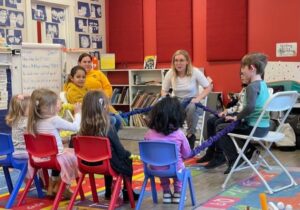 Based on the groundbreaking work of Dr. Kate Gfeller, University of Iowa and Advisory Board member, FHSR has realized our long-term goal to expand our music programming to include Music Therapy for children living with hearing loss.
Based on the groundbreaking work of Dr. Kate Gfeller, University of Iowa and Advisory Board member, FHSR has realized our long-term goal to expand our music programming to include Music Therapy for children living with hearing loss.
Meeting once a week for an hour over the course of 12 weeks (with two weeks off for Spring Break), this interactive and engaging program has the goal of sharpening a DHH child’s listening skills while boosting their self-esteem, socialization, and articulation with their peers in a fun musical setting. Siblings (when of the appropriate age) are able to be included in classes so the whole family can reap the benefits – research shows improved outcomes for DHH children whose siblings actively participate in interventions like music therapy.
To make music therapy accessible to deaf and hard of hearing children, FHSR partnered with top music therapy group Prospect Music Therapy and lead researcher Laura Pawuk, who holds a PhD in Music and Therapeutic Arts from Eastern Michigan University, to create a specific curriculum. Our professional music therapists were trained with this tool to provide musical experiences that are accessible to kids with a variety of hearing profiles. By offering the curriculum in a small group setting, the music therapists are able to establish accommodations, and take an individualized approach to each child – so everyone in the session reaches their potential – while also having fun!
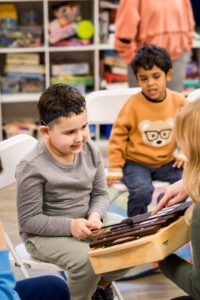 Based on parent & therapist feedback from past sessions, our participants benefitted by engaging in music activities with their peers, resulting in increased listening skills, growth in self-esteem and sound identification. In past sessions every student saw progress on their individualized goals.
Based on parent & therapist feedback from past sessions, our participants benefitted by engaging in music activities with their peers, resulting in increased listening skills, growth in self-esteem and sound identification. In past sessions every student saw progress on their individualized goals.
The goal of FHSR’s Music Therapy program is to encourage growth in personal enrichment, self-esteem and oral communication. We call it “sneaky therapy” – it’s so much fun, kids don’t even realize that they’re learning!
Music therapy begins in January 2026 in Western Springs and Arlington Heights.
Notice for parents and caregivers: participants in FHSR’s 2026 Music Therapy program will be invited to participate in a research study led by Dr. Hae Sun Kim of the University of Iowa. This study aims to improve the FHSR Music Therapy Assessment, a tool designed to help clinicians better understand the developmental and communication skills of children who are deaf or hard of hearing (DHH) ages 4–9. The goal is to ensure the tool is clear, reliable, and useful for supporting children’s learning and growth. Ultimately, this research will help improve FSHR’s Music Therapy program and help future students access this effective therapy. Participation is completely voluntary, and all information collected will be kept confidential. Parents/caregivers will be asked to sign a consent form acknowledging their child(ren)’s participation in the study before the 2026 Music Therapy program begins, at which point you will have an opportunity to ask questions and receive more information.
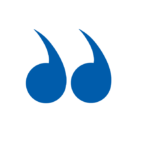
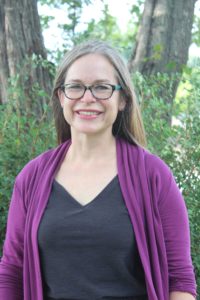 Loren is a board-certified music therapist and the founder of Prospect Music Therapy. She studied music therapy at the University of Dayton and later completed her master’s degree in Creative Arts Therapy – Music Therapy at MCP Hahnemann University in Philadelphia. Loren has experience providing music therapy in a variety of settings including special education, hospice, dementia care, and the medical field. She loves working in Mount Prospect, the community where she lives with her husband, four children, and chihuahua, Skippy.
Loren is a board-certified music therapist and the founder of Prospect Music Therapy. She studied music therapy at the University of Dayton and later completed her master’s degree in Creative Arts Therapy – Music Therapy at MCP Hahnemann University in Philadelphia. Loren has experience providing music therapy in a variety of settings including special education, hospice, dementia care, and the medical field. She loves working in Mount Prospect, the community where she lives with her husband, four children, and chihuahua, Skippy.
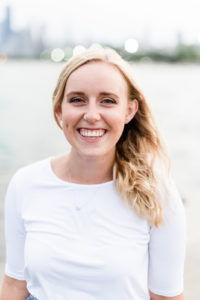 Erika earned her bachelor’s degree in Music Theory and Psychology, with a minor in Honors Humanities at Azusa Pacific University. She went on to pursue her equivalency and master’s degree in Music Therapy at the University of Iowa. Erika assisted with research on an National Institutes of Health (NIH) program investigating music perception and enjoyment for cochlear implant recipients at the University of Iowa Hospitals & Clinics Music Perception Lab under the direction of Dr. Kate Gfeller. She conducted her own research about protecting and preserving hearing and presented her findings at a national audiology conference in February 2022. She has experience working with older adults with dementia, multiple disabilities, and other neurological disorders, as well as kids with hearing loss. Erika currently works as a music therapist at Niles Township District for Special Education with kids ages 3-22.
Erika earned her bachelor’s degree in Music Theory and Psychology, with a minor in Honors Humanities at Azusa Pacific University. She went on to pursue her equivalency and master’s degree in Music Therapy at the University of Iowa. Erika assisted with research on an National Institutes of Health (NIH) program investigating music perception and enjoyment for cochlear implant recipients at the University of Iowa Hospitals & Clinics Music Perception Lab under the direction of Dr. Kate Gfeller. She conducted her own research about protecting and preserving hearing and presented her findings at a national audiology conference in February 2022. She has experience working with older adults with dementia, multiple disabilities, and other neurological disorders, as well as kids with hearing loss. Erika currently works as a music therapist at Niles Township District for Special Education with kids ages 3-22.
“Rooted in science and delivered in a fun musical setting, the cooperative nature of musical activities in a music therapy program for deaf and hard of hearing children leads to the use of communicative skills through attaining social goals of turn taking, following direction, cooperation and awareness of others in addition to improved listening skills, spoken language and language development.”
"Music Therapy for Preschool Cochlear Implant Recipients", Gfeller et al, NIH –PA Music Therapy Perspective June 2011
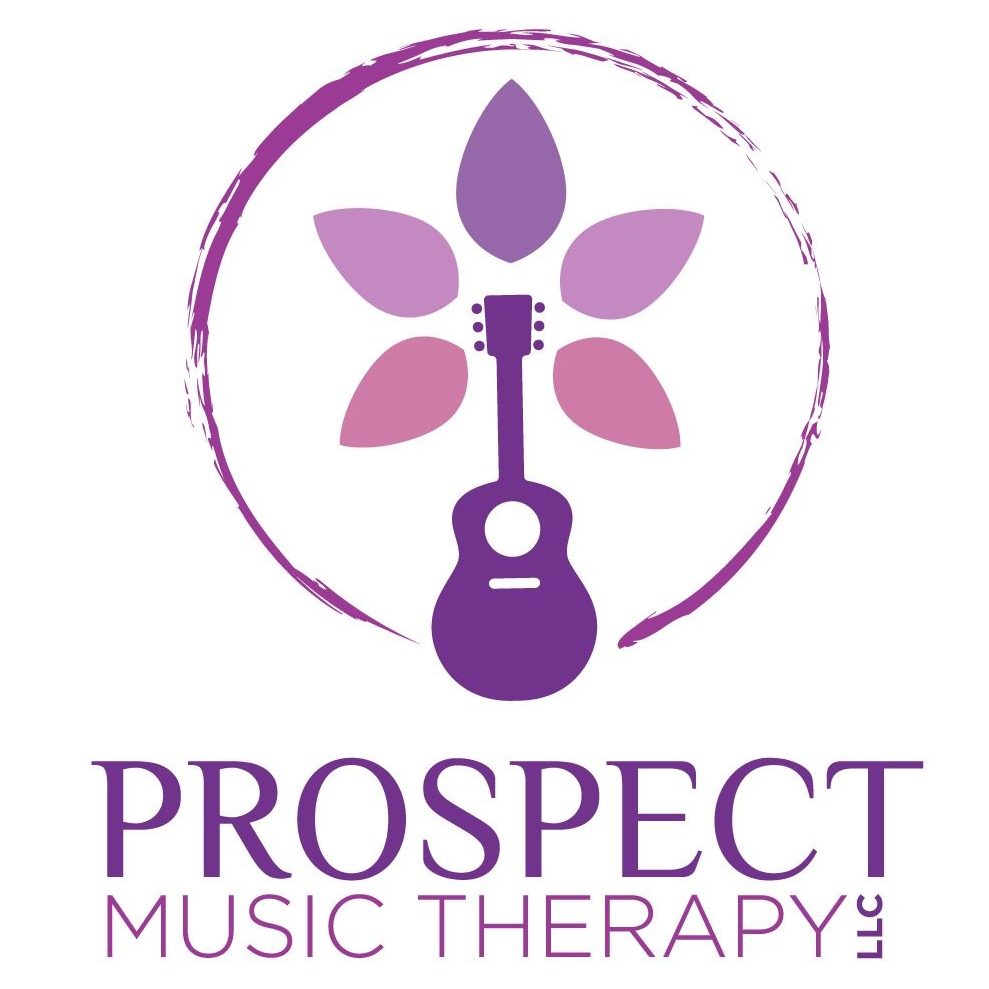
Music is a whole-brain activity that generates physiologic responses. Its predictable and structured nature can improve attention, enhance learning, and expand communication. Music listening and creation are motivating social experiences that can access memories and express or alter emotions.
As music therapists, we feel honored to connect with our clients through the art form that we love. As a team, we continually work to improve our skills through continuing education and peer supervision, and our work benefits from our ability to consult with one another.

The University of Iowa has a free-access curated website (part of the Iowa Head and Neck Protocols) that provides information about music and hearing loss. Topics include:
BE A PART OF IT ALL.
We hope you will consider making a sound investment in our children. Thank you!